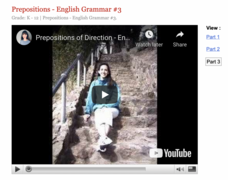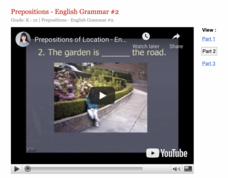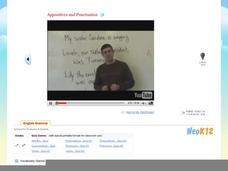Curated OER
Basic English Grammar - The Simple Past Tense #2
In part two of "Basic English Grammar - The Simple Past Tense," the reason to use simple past tense is explained more thoroughly. The same video from part one is shown with questions focusing on the reason the past tense is used....
Curated OER
Basic English Grammar - The Simple Past Tense #4
Practice forming questions and pronouncing them correctly in part four of Basic English Grammar - The Simple Past Tense. Questions are formed based on the subject and the object from part three. Scrambled sentences are given to put in...
Curated OER
Basic English Grammar - The Simple Past Tense #3
Part three of Basic English Grammar concentrates on asking questions in the simple past tense. A review using a different scenario covers types of past tense verbs, asking learners to fill in the correct form of the verb in various...
Curated OER
Prepositions - English Grammar #1
Discover how to use prepositions in order to talk about location and direction. Definitions of prepositions, prepositional phrases, noun phrases, and more are given. Separate prepositions are then discussed and used in sentences....
Curated OER
Prepositions - English Grammar #3
Finish the series on prepositions of location and direction in this video. Direction and location are distinguished with a description and a vignette at the local playground. Viewers then see a statement and choose the correct...
Curated OER
Prepositions - English Grammar #2
Continue learning about prepositions of location and direction in part two with Jennifer. Different prepositions are discussed with the same fill-in-the-blank format from part one. The video ends with questions where the viewer chooses...
Curated OER
Basic English Grammar - The Simple Past Tense #1
Listen to a few sentences describing the actions of the person shown. The sentences are then written in the past-tense for you to see and identify the simple past-tense verbs. Regular and irregular verbs are then defined with sentences...
Ereading Worksheets
Common and Proper Nouns | Parts of Speech App
Enhance instruction with a video focusing on common and proper nouns. Go in depth into the types of nouns and the difference between common and proper. Follow up the learning portion of the video with an interactive pop quiz, and end the...
Ereading Worksheets
Singular, Plural, and Possessive Nouns | Parts of Speech App
Give your noun instruction a boost, with an in-depth presentation into singular, plural, and possessive nouns. First, enthusiastic grammarians learn about each noun in detail; then, take part in an interactive pop quiz, and end the...
Curated OER
English Grammar & Writing - Capitalization
Go over the basics of capitalization and when to use upper-case letters. A young woman with a whiteboard writes examples and explains. This is a good resource for ELL or ELD students due to its simplicity. One grammatical mistake is made...
TED-Ed
Beware of Nominalizations (AKA Zombie Nouns)
Save your sentences from the zombie apocalypse! All you need are juicy, verb-driven sentences. Watch the video to find out how to awaken the living dead in your writing, and then how to put the dead to rest and the life back into your...
Ereading Worksheets
Pronoun Case and Perspective | Parts of Speech App
Get to know subject, object, and reflexive pronouns with an informative and appealing video that offers insight and guidance into writing grammatically correct sentences. Individuals are provided with the opportunity to check for...
Curated OER
The Truth about Apostrophes
Look at ownership (possession) with Yossarian the Grammarian regarding apostrophes. Singular and plural nouns are covered.
Curated OER
Infinitive Phrases
Yossarian the Grammarian describes the infinitive as either an adjective, adverb, or noun. A sentence is given for each example on the whiteboard, comparing the infinitive to other adjectives, adverbs, and nouns so that the function of...
Learning Upgrade
Pronouns 1 Song
Introduce your language arts class to their new favorite song with a video about pronouns. Hip, informative, and very catchy, the song demonstrates several different ways to replace nouns with pronouns.
Curated OER
Copulative Verbs and Subjective Complements
Copulative verbs, also known as linking verbs, "link" subjective complements and the original noun, basically renaming the noun. The copulative verb acts like an equal sign. Follow Yossarian the Grammarian as he explains several sentence...
Curated OER
The Preposition and Prepositional Phrase
Clarify what a preposition truly is. Prepositions come before some noun (object of the preposition) and together with that noun, to make prepositional phrases. The phrases work as adjectives or adverbs, more like a single word. Yossarian...
Curated OER
What Adjectives Are
Review the definition of an adjective. Adjectives modify nouns, and Yossarian the Grammarian shows the three questions adjectives answer: Which one? What kind of? and How many?
Curated OER
The Nominal Phrase
A nominal phrase consists of two verbs that function as a noun, according to Yossarian the Grammarian. He explains various parts of speech in two sentence examples written on a whiteboard.
Curated OER
Coordinating Conjunctions and Comma Splices
Use the mnemonic FANBOYS in order to avoid comma splices by connecting nouns and independent clauses with coordinating conjunctions. Yossarian the Grammarian gives sentence examples that included coordinating conjunctions.
Curated OER
Subordinate Clauses
A subordinate clause, or dependent clause, has a subject-verb combination but it cannot stand on its own because it is an incomplete thought that does not make sense. Yossarian the Grammarian explains that each clause can function like a...
Curated OER
Appositives and Punctuation
Appositives rename nominal phrases that they are next to. These are two equal nouns. Yossarian the Grammarian gives several examples on his whiteboard as he continues to talk about restrictive and non-restrictive phrases as well.
Curated OER
Gerunds and Gerund Phrases
The gerund is described as just like the present participle by Yossarian the Grammarian. Look for the -ing ending to discover where the gerund is in the sentence.
Study
Pronouns: Relative, Reflexive, Interrogative
Gary, the grammar gorilla, graciously introduces viewers to a variety of pronouns and models how relative, reflexive, and interrogative pronouns operate in a sentence. This presentation is more complex than the other resources in the...

























